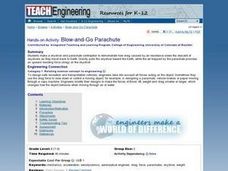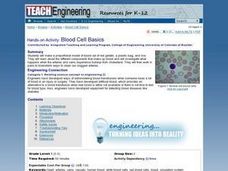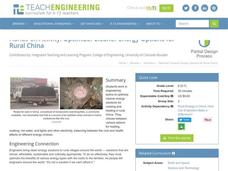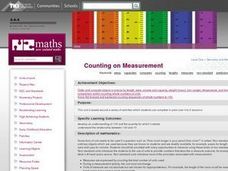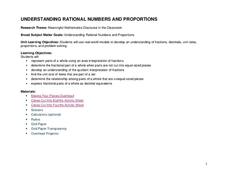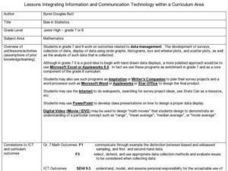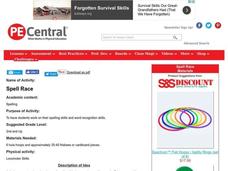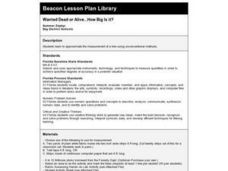Teach Engineering
Ramp and Review (for High School)
Rolling for momentum. As part of a study of mechanical energy, momentum, and friction, class members experiment rolling a ball down an incline and having it collide with a cup. Groups take multiple measurements and perform several...
Curated OER
A Closer look at Oil and Energy Consumption
Upper graders analyze basic concepts about the consumption, importation and exportation of the worlds oil production. They create several graphs to organize the data and draw conclusions about the overall use of oil in the world.
Teach Engineering
Protecting Our City with Levees
Teams use the design process to design, build, and test a model levee to protect the town from a wall of water. A handout provides a price list for the materials learners can use to build their levee within a budget.
Curated OER
Break the Tension
Learners experiment with the concepts of surface tension. They participate in a number of different experiments that introduce them to surface tension. They work in a small group in order to conduct these experiments.
Curated OER
Blow-and-Go Parachute
Students design a skydiver and parachute constraption to demonstrate how drag caused by air resistance slows the descent of skydivers as they travel back to Earth. They experience how gravity pulls the skydiver toward the earth and how...
Curated OER
Moebius Strips
Learners make Moebius strips and use them to demonstrate the interconnectedness of an environment. They explore the natural cycles (water, oxygen/carbon dioxide, carbon, nitrogen) within the environment. They describe how the cycles are...
Teach Engineering
Energy Forms and States Demonstrations
Does a tennis ball have energy? What about a bowling ball? Demonstrate concepts of different forms of energy forms and states with a variety of objects. Using the equations for potential and kinetic energy, learners determine the amount...
Teach Engineering
Surface Tension Lab
What constitutes a good soap bubble? In the second installment of a nine-part series, scholars apply their understanding of surface tension to soap bubbles. They experiment to determine the best solutions to use for the...
Teach Engineering
Measuring Surface Tension
How do you measure surface tension? The fifth installment of a nine-part series is an experiment where young scientists use tubes of different sizes to measure surface tension. They calculate the average and standard deviation of the...
Curated OER
Blood Cell Basics
Young scholars design a proportional model of blood out of red gelatin, a plastic bag, and rice. They study the components that make up blood and investigate what happens when the arteries in different scenerios. They work in pairs in...
Teach Engineering
Optimize! Cleaner Energy Options for Rural China
What are the trade-offs when looking to get the most benefit from an energy source? Small groups compare the cost-to-emission levels of several energy sources by looking at the information graphically. The groups utilize this information...
Teach Engineering
Energy Storage Derby and Proposal
Small groups use the engineering design process to build and test a vehicle capable of carrying 250 grams a distance of five meters. The design must allow for the storage of potential energy and turn it into motion, allowing the...
Curated OER
Why We Study Trigonometry
Learners investigate the different properties of trigonometry. In this precalculus lesson, students find the six different identities of trigonometric ratios. They relate the ratios to that of a right triangle and apply it to real life...
Curated OER
Counting on Measurement
First graders explore measurement. They measure by counting non-standard units. Students use a variety of non-standard units to predict and measure volume of various containers using rice.
Curated OER
Forensics 101
Students interpret how to communicate information and ideas in ways that are appropriate to the purpose and audience through spoken, written, and graphic means of expression. They use information-gathering techniques, analyze and...
Curated OER
Understanding Rational Numbers and Proportions
Students explore parts of a whole. In this fraction lesson, students determine what makes a fair share. Working with manipulatives, students solve mathematical problems containing fractions.
Curated OER
Double This
Learners change verbal expressions to algebraic equations. They practice the vocabulary of algebraic equations.
Curated OER
A Nation of Nations Lesson Plan: Charting African Ethnicities in America
High schoolers read a portion of the narrative, The Transatlantic Slave Trade, to explain the ethnic origins of enslaved Africans brought to the US. They create charts and bar graphs comparing ethnicities in the lowlands and tidewater...
Curated OER
Bias in Statistics
Students work to develop surveys and collect data. They display the data using circle graphs, histograms, box and whisker plots, and scatter plots. Students use multimedia tools to develop a visual presentation to display their data.
Curated OER
Telling Time
In this telling time worksheet, students cut out forty-two clocks, shuffle the clocks and then put them in sequential order by telling time in fifteen minute increments starting at 1:00am.
Texas Instruments
Say What You Mean!
Students analyze data and identify the mean. In this probability lesson, students log data in the TI and construct scatter plots from the data. They identify properties of a scatterplot.
Curated OER
Spell Race
Students work on their spelling skills and word recognition skills while using different locomotor movements.
Curated OER
Rocking the Boat
Students work together to discover the concepts of stability and equilibrium. They examine how equilibrium is related to an item's center of mass. They create their own action scene in a literacy activity.
Curated OER
Wanted Dead or Alive...How Big Is it?
Fourth graders estimate the measurements of trees using unconventional techniques.






